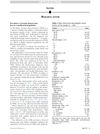 2 citations,
February 2022 in “Menopause”
2 citations,
February 2022 in “Menopause” Over half of postmenopausal women experience hair loss, with severity increasing with age, time since menopause, and higher body mass index.
[object Object]  2 citations,
April 2021 in “Journal of The American Academy of Dermatology”
2 citations,
April 2021 in “Journal of The American Academy of Dermatology” Female pattern hair loss affects 32.3% of women, increasing with age and showing no racial differences.
 2 citations,
March 2021 in “Dermatologic Therapy”
2 citations,
March 2021 in “Dermatologic Therapy” Low-level laser therapy helps increase hair growth in female pattern hair loss but not in telogen effluvium.
 2 citations,
January 2020 in “International Journal of Medical Sciences”
2 citations,
January 2020 in “International Journal of Medical Sciences” Avoid alcohol, ponytails, and oily scalp, and get good sleep to prevent severe hair loss.
 2 citations,
December 2019 in “Journal of Dermatological Treatment”
2 citations,
December 2019 in “Journal of Dermatological Treatment” Metabolic syndrome reduces effectiveness of hair loss treatment.
 2 citations,
December 2019 in “Biomedical dermatology”
2 citations,
December 2019 in “Biomedical dermatology” Minoxidil works faster, but ketoconazole is a safer alternative for female hair loss.
2 citations,
November 2018 in “Seminars in Cutaneous Medicine and Surgery” Combining different treatments works best for female hair loss.
 2 citations,
December 2015 in “International Journal of Dermatology”
2 citations,
December 2015 in “International Journal of Dermatology” Washing test helps identify hair loss type, low iron levels significant.
 2 citations,
September 2012 in “PubMed”
2 citations,
September 2012 in “PubMed” Topical minoxidil effectively treats Female Pattern Hair Loss in women of all ages and hormone levels, but evidence for antiandrogens is limited.
2 citations,
March 2011 in “Hair transplant forum international” Female pattern hair loss involves hair follicles shrinking, influenced by hormones like melatonin and prolactin.
2 citations,
August 2010 in “The Open Dermatology Journal” Female pattern hair loss negatively affects quality of life, and treatment does not improve it within two months.
 1 citations,
January 2023 in “Journal of the European Academy of Dermatology and Venereology”
1 citations,
January 2023 in “Journal of the European Academy of Dermatology and Venereology” The article concludes that more research is needed on how to diagnose and treat hair loss in women with polycystic ovary syndrome.
1 citations,
October 2022 in “Current Opinion in Endocrinology, Diabetes and Obesity” Female pattern hair loss is common in women with polycystic ovarian syndrome.
1 citations,
October 2022 in “Journal of Cosmetic Dermatology” Combining microneedling with 2% minoxidil is more effective and safe for treating female pattern hair loss than using minoxidil alone.
1 citations,
July 2022 in “JEADV Clinical Practice” New and existing treatments for hair loss show promise, with some being more effective for men and others for women.
1 citations,
March 2022 in “Journal of The American Academy of Dermatology” Adjusting minoxidil dosage may be safer than using bicalutamide for hair loss in women.
 1 citations,
January 2022 in “Transgender health”
1 citations,
January 2022 in “Transgender health” Hormone therapy in transgender individuals can increase acne and affect hair growth and loss.
 1 citations,
January 2022 in “Journal of Cosmetic Dermatology”
1 citations,
January 2022 in “Journal of Cosmetic Dermatology” Taking oral vitamin D and applying topical minoxidil together can better treat female pattern hair loss than using either treatment alone.
1 citations,
December 2021 in “Siriraj Medical Journal” Female pattern hair loss in Thailand varies by region and demographics, affecting diagnosis and treatment.
1 citations,
October 2021 in “QJM: An International Journal of Medicine” Double-spin PRP is more effective for treating female hair loss than single-spin PRP.
1 citations,
August 2021 in “Medical Science Monitor” Male and female hair loss have different genetic causes.
1 citations,
August 2021 in “Journal of Cosmetic Dermatology” Female pattern hair loss is more common in rural areas among secondary school girls.
[object Object] 1 citations,
March 2021 in “Frontiers in Medicine” Female pattern hair loss shows similar characteristics in both genders and should be classified by hair loss patterns, not gender.
1 citations,
March 2021 in “CRC Press eBooks” Oral minoxidil may be a better treatment for hair loss than topical minoxidil.
 1 citations,
January 2021 in “Journal of the Dermatology Nurses’ Association”
1 citations,
January 2021 in “Journal of the Dermatology Nurses’ Association” The convention discussed various skin conditions and treatments, and highlighted the importance of vaccinations for patients on immune-altering medications.
 1 citations,
May 2020 in “Journal of The American Academy of Dermatology”
1 citations,
May 2020 in “Journal of The American Academy of Dermatology” Women with hair loss should be checked for PCOS, as it's often related and early diagnosis can help with treatment.
1 citations,
January 2020 in “Postepy Dermatologii I Alergologii” Family history, especially on the mother's side, increases the risk of female pattern hair loss.
1 citations,
January 2020 in “Bioscientia medicina” Female pattern hair loss is common, worsens with age, and requires long-term treatment to manage.
1 citations,
January 2019 in “Journal of the Egyptian Women's Dermatologic Society (Print)” Minoxidil 2% is more effective for female hair loss, but botanicals have fewer side effects.

Hair transplants are effective for male and female pattern baldness, have evolved in technique, and require careful planning for natural results and managing complications.














